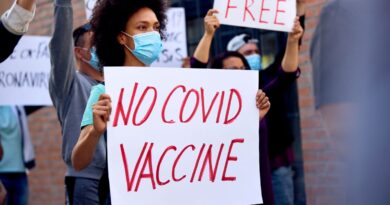New Meta-Analysis Concludes Lockdowns “Have Had Little to No Effect on COVID Mortality”

A new meta-analysis regarding the effectiveness of lockdowns examined evidence to determine if there is actually any empirical evidence to support the belief that lockdowns reduce COVID-19 mortality.
It was published by Jonas Herby, a special advisor at the Center for Political Studies in Copenhagen, Denmark. Lars Jonung, a professor emeritus in economics at Lund University in Sweden, and Steve H. Hanke, a professor of Applied Economics and Founder & Co-Director of The Johns Hopkins Institute for Applied Economics, Global Health, and the Study of Business Enterprise.
The meta-analysis looked at 18,590 studies that address the belief that lockdowns were effective. The authors explain,
“After three levels of screening, 34 studies ultimately qualified. Of those 34 eligible studies, 24 qualified for inclusion in the meta-analysis. They were separated into three groups; lockdown stringency index studies, shelter-in-place order (SIPO) studies, and specific NPI studies. An analysis of each of these three groups support the conclusion that lockdowns have had little to no effect on COVID-19 mortality.
More specifically, stringency index studies find that lockdowns in Europe and the United States only reduced COVID-19 mortality by 0.2% on average. SIPOs were also ineffective, only reducing COVID-19 mortality by 2.9% on average. Specific NPI studies also find no broad-based evidence of noticeable effects on COVID-19 mortality.”
The paper goes into detail about the screening methods applied. 1,048 studies remained after a title-based screening. After this 931 were excluded because they did not measure the effect of lockdowns on mortality or did not use an empirical approach. 117 were left, read and inspected for a more thorough assessment by the authors, which left only 34 studies that were eligible for this meta-analysis.
The paper points out that researchers at the Imperial College London early on in the pandemic (Ferguson et al. (2020)) predicted that lockdown strategies would reduce COVID-19 mortality by up to 98%. This is what motivated the researchers to look into this deeper. Another big motivation was the fact that “there was no clear negative correlation between the degree of lockdown and fatalities in the spring of 2020.”
“Given the large effects predicted by simulation studies such as Ferguson et al. (2020), we would have expected to at least observe a simple negative correlation between COVID-19 mortality and the degree to which lockdowns were imposed.”
Overall, despite that the topic still seems to remain an open debate with no clear answers, this meta analysis found that lockdowns, school closures, border closures, and limiting gatherings have had and no effect on COVID-19 mortality. They did however find that business closures may have reduced COVID-19 mortality, “but the variation in estimates is large and the effect seems related to closing bars.”
All kinds of studies were used, ones with controls and ones without, peer reviewed literature, working papers, long term data, short term data etc.
The report dives deep into the data, methods and limitations. All studies can be criticized, so it’s important to go through the report for yourself and take away whatever conclusions you may.
Keep in mind that currently, there are more than 400 studies on the failure of compulsory COVID interventions.
One thing that is certain across the board, however, regardless if one thinks lockdowns did or did not have any effect on COVID-19 mortality, they did indeed have catastrophic consequences. This has been evident throughout the pandemic.
For example, renowned Swedish Clinical professor in infectious disease and professor of epidemiology from the Karolinska Institute, Anna-Mia Elkström, along with professor Stefan Swartling Peterson, a Public Health Physician and Professor of Global Health also from the Karolinska Institute, found that nearly one year into the pandemic, lockdowns may have killed more people than COVID. They did so by going through data collected by UNICEF and UNAIDS. They were interviewed about these findings multiple times in Sweden.
Just seven months into the pandemic, Germany’s Minister of Economic Cooperation and Development, Gerd Muller, cautioned that global lockdown measures will result in the killing of more people than COVID itself.
Just five months into the pandemic a Lancet study reported that government strategies to deal with COVID such as lockdowns, physical distancing, and school closures are worsening child malnutrition globally, whereby “strained health systems and interruptions in humanitarian response are eroding access to essential and often life-saving nutrition services.”
Just nine months into the pandemic, on an international scale the lockdowns placed 130 million people on the brink of starvation. Even The World Economic Forum estimated that the lockdowns will cause an additional 150 million people to fall into extreme poverty, 125 times as many people as have died from COVID.
In November 2020, Professor David Paton, Professor of Economics at the University of Nottingham and Professor Ellen Townsend, a Professor of Psychology at the University of Nottingham School of Medicine wrote the following,
Taken together, the data are clear both that national lockdowns are not a necessary condition for Covid-19 infections to decrease and that the Prime Minister was incorrect to suggest to MPs that infections were increasing rapidly in England prior to lockdown and that without national measures, the NHS would be overwhelmed…Lockdowns have never previously been used in response to a pandemic. They have significant and serious consequences for health (including mental health), livelihoods and the economy. Around 21,000 excess deaths during the first UK lockdown were not Covid-19 deaths. These are people who would have lived had there not been a lockdown.
A paper published by the National Bureau of Economic Research in June 2021 found that excess deaths increased shortly after the implementation of these measures.
A paper published by SSRN, a well known global E-Library that provides 1,063,815 research papers from 693,848 researchers in more than 65 disciplines explains,
The extent of human life loss due to lockdowns themselves has never been taken into consideration in the decision-making process…The forecasts which were chosen for political decision making systematically overestimated the threat, supporting excessive measures. The pro-lockdown evidence is shockingly thin, and based largely on comparing real-world outcomes against dire computer-generated forecasts derived from empirically untested models.
I digress, I think you get the point.
All if this is mixed in with the fact that for most healthy people, COVID has a high survival rate, and ones chances of ending up in the hospital are quite slim. This is even more pronounced for children. Most people who suffer from COVID are already quite ill. In the United States for example, 95 percent of people who died with COVID also had an average of four other causes listed on their death certificate. In the UK, there have only been 6,183 deaths caused solely by COVID in England and Wales between Feb 2020 and Dec 2021.
It seems like a more focused protection approach like The Great Barrington Declaration advocated for would have been a more adequate approach. This brings me to my next point, mass censorship.
Whether or not lockdowns were effective at reducing COVID-19 mortality is besides the point. Why was there such an active campaign to censor and ridicule scientists and experts who opposed these measures? A proper discussion and debate was not had within the mainstream, instead the masses were led to believe that these sentiments were coming from “conspiracy theorists” and not actual data. This censorship in itself is suspicious, the truth does not take much to defend itself, so if lockdowns were so effective why put such a large effort into censoring opinion and evidence stating otherwise?
This new meta-analysis will be added to the long list of data sets that have gone completely ignored by government health agencies, who have a long history of not being able to admit when they’ve been wrong while completely ignoring information that opposes what they deem to be fact, when in fact, it could be fiction.
*
Note to readers: Please click the share buttons above or below. Follow us on Instagram, @globalresearch_crg. Forward this article to your email lists. Crosspost on your blog site, internet forums. etc.
Featured image is from 123RF


